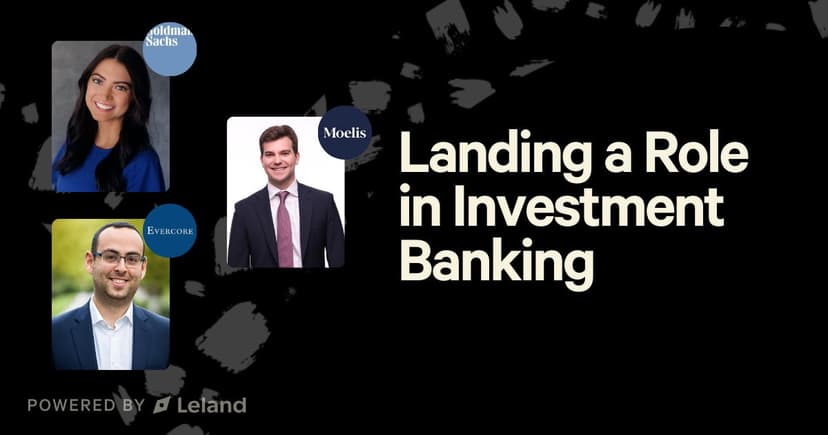JP Morgan Interview Guide: Process, Questions, & Tips (2025)
Prepare for your JP Morgan interview with expert tips on JP Morgan interview questions, the hiring process, and strategies to stand out. Get ready to succeed!
Posted October 25, 2025

Join a free event
Learn from top coaches and industry experts in live, interactive sessions you can join for free.
Table of Contents
Discover more about JP Morgan's mission, programs, and career opportunities to see how you can be part of their team.
JP Morgan’s Analyst and Summer Analyst programs in investment banking are some of the most competitive entry points in finance. Acceptance rates are often below 1–2%. The hiring process is designed to measure not just technical ability but also cultural fit and your potential to perform in high-pressure client situations.
This guide walks through the hiring process, common JP Morgan interview questions, and detailed preparation strategies specifically for investment banking Analysts and Summer Analysts.
For more information, visit JPMorgan Chase & Co.
The JP Morgan Hiring Process
First Step: Application & Resume Screening
Before you reach any interview round, your resume has to clear JPMorgan’s Applicant Tracking System (ATS) and impress recruiters who review hundreds of applications for each opening. In banking, this step is highly competitive; a strong GPA and brand-name experience help, but relevance, clarity, and quantifiable impact are what get you through.
What Recruiters Look For in IB Analyst/Summer Analyst Resumes:
Alignment with the Job Description
- Keywords from the posting (e.g., “financial modeling,” “valuation,” “Excel”) naturally included in your bullets.
- Evidence you’ve done work similar to Analyst tasks, comps, pitchbooks, industry research, and transaction analysis.
Demonstrated Fit with JP Morgan’s Business Principles
- Stories or bullet points showing teamwork, integrity, client focus, and long-term thinking.
- Leadership roles where you influenced outcomes and supported a team’s success.
- Demonstrating alignment with at least one core business principle is essential, as these business principles guide company behavior and decision-making.
Strong Academic Performance
- A GPA typically 3.5+ is competitive; exceptions are rare without exceptional work experience or leadership achievements.
- Relevant classes (Corporate Finance, Financial Accounting, Statistics, M&A, Capital Markets) can add weight.
Quantifiable Results from Finance-Related Experience
- Recruiters want to see measurable outcomes, not just responsibilities.
- Strong bullets start with action verbs and include metrics.
Analyst/Summer Analyst Resume Quick Wins
| Section | What to Highlight | Strong Example |
|---|---|---|
| Experience | Live deal work or simulations (case comps, internships) | “Built comps and precedent transaction analyses for $500M sell-side pitch; materials presented to CFO.” |
| Skills | Core banking tools and outputs | “Developed 3-statement model in Excel for case competition; delivered pitch to alumni panel.” |
| Leadership | Roles in finance clubs, investment teams, or competitions | “Led 8-member team to top 5% finish in JPMorgan Investment Challenge; coordinated research and valuation.” |
Advanced Resume Tips for JP Morgan IB Applications
Lead with IB-Relevant Content:
Place finance experience above unrelated jobs. Even a strong retail role should be below finance-related bullets.
Quantify Everything:
Use deal size, % improvement, number of companies analyzed, or audience reached. Example: “Created industry report covering 25 companies; influenced team’s final stock pitch decision.”
Condense to One Page:
Analysts and Associates reviewing your resume won’t read past the first page. Every line must earn its place.
Mirror the Language of the Posting:
If the job ad says “valuation analysis,” use that term exactly in one of your bullet points where it fits truthfully.
Order by Impact:
Put the most impressive experience first in each section, not necessarily the most recent.
Review with Finance Peers:
Have at least one person with IB experience review your resume before submitting, as they know what deal language should look like.
Read: The Top 10 Investment Banks – By Size & Tier (2025)
Second Step: Online Assessment (HireVue)
Once your resume passes the ATS and catches the recruiter’s attention, the next step is typically an online assessment via the HireVue platform. This stage serves as an early elimination round designed to evaluate both your technical skills and cultural fit through behavioral and market-related questions.
JP Morgan uses HireVue to conduct pre-recorded video interviews. You will receive several questions, most of which are behavioral in nature. The format is timed, with the opportunity to re-record your answers if necessary. While this might seem straightforward, it’s critical to treat this as seriously as a live interview, because this step plays a significant role in your advancement to the next round.
How the Online Assessment Works
After you’re invited to take the assessment, you’ll receive an email with a link to the platform. In the behavioral portion, you’ll typically answer 2–3 questions related to your personal background, teamwork, and problem-solving. You may also face market-related questions that assess your knowledge of current events, finance, and the economy.
Example Behavioral Questions:
- “Tell me about a time when you had to solve a problem without much guidance.”
- “Describe a situation when you had to work with a difficult person on your team. How did you handle it?”
Example Market Questions:
- “What’s one recent market event that you believe could affect JP Morgan’s clients?”
- “How do you think rising interest rates will impact the investment banking landscape?”
Expert Tips for Success:
- Prepare for Technical Prompts
Even though most questions are behavioral, you may be asked some technical finance-related questions. These could range from basic accounting principles to a quick overview of recent trends in mergers and acquisitions (M&A). Review your financial concepts, especially how to link the three financial statements and understand valuation methods (like DCF and comps). - Set the Right Environment
Because the assessment is done remotely, ensure that your environment is quiet, well-lit, and free of distractions. Treat this like an in-person interview by dressing professionally and having the technology ready (check your camera and microphone before starting). - Answer with Confidence and Clarity
You have two attempts to record each answer, but remember that recruiters are looking for answers that are clear, concise, and confident. Avoid rambling or talking too fast. Keep your answers structured using the STAR method: Situation, Task, Action, Result. - Practice Mock Interviews
Using mock interview platforms or practicing with friends and family will help you get comfortable with the format. Aim for a conversational tone; this will help you seem more genuine and approachable in the assessment. - Do Your Research
Review recent JP Morgan news, earnings reports, and market trends. The more familiar you are with what’s happening in the financial world, the easier it will be to answer market-related questions accurately.
Third Step: First Round – Behavioral Interview
After passing the online assessment, the next stage is the first round of live interviews, which is typically behavioral. You’ll meet with one or more Analysts or Associates, and sometimes VPs, depending on the role. The focus of the first round is to assess how well you work in a team, solve problems, and handle challenges. Expect questions that dive into your past experiences, where you’ll need to provide examples that showcase your skills and fit with the team. As an Analyst or Summer Analyst, the interviewers will want to see how you’ve handled responsibility, how you manage pressure, and how you navigate interpersonal dynamics.
Common Behavioral Interview Questions:
- “Describe a time you worked with a team on a project. What role did you play, and how did you contribute?”
- “Tell me about a time you had to lead a project under a tight deadline. How did you manage your time and resources?”
Expert Tip: When answering, always link your response to the Analyst role. Talk about the specific skills you used, whether it was Excel modeling, financial analysis, or client presentations, and emphasize how those skills will help you succeed in the next stages of the interview process.
Fourth Step: Second Round – Technical & Market Knowledge
In the second round, expect a deeper dive into your technical skills and market knowledge. Analysts at JP Morgan are expected to be both strong communicators and skilled financial modelers, so the interview will likely consist of a mix of technical questions and market-related discussions. Candidates applying for hybrid or technology-focused roles may also encounter coding questions, with a particular emphasis on languages like Java.
Here’s where your ability to explain complex concepts like valuation or M&A can make a big difference. You may be asked to walk through a DCF or explain how to conduct a comparables analysis. You’ll also likely face questions that test your understanding of current market conditions and how those conditions might affect your work as an Analyst.
Technical Questions You Might Face:
- “Walk me through a Discounted Cash Flow (DCF) model.”
- “What’s the difference between enterprise value and equity value?”
- “If a company misses earnings, what do you expect to happen next in terms of stock price?”
Market Knowledge Questions:
- “How would you assess a company in an industry that is seeing a decline in revenue?”
- “What’s your take on the effect of rising interest rates on M&A activity in the next quarter?”
Note: Be sure to relate everything you discuss to past experiences, whether from coursework, internships, or personal projects.
Fifth Step: Final Round / Superday
The Superday is the culmination of the hiring process, and it’s a critical part of securing your spot as an Analyst or Summer Analyst. It’s an intense full-day interview session that typically consists of multiple rounds of interviews with different team members. During Superday, you’ll likely face a mix of both behavioral and technical questions.
One thing to note is that the Superday is designed to test your ability to stay consistent under pressure. Interviewers will look at how well you handle multiple rounds of interviews, remain composed, and maintain clarity in your responses.
Expect the following on Superday:
- 3-5 interviews with various members of the team (from Analysts to VPs).
- More in-depth technical questions (i.e., financial models, accounting questions, and valuation exercises).
- Behavioral questions that probe your teamwork and conflict resolution skills. For example, “Tell me about a time you had to resolve a conflict within a team.”
Expert Tip: Superday is also a chance for you to assess whether JP Morgan is the right fit for you. Be sure to ask thoughtful questions about the team structure, culture, and expectations. It’s important to show genuine interest, not just in the firm’s reputation, but in how you will grow within the team.
What JP Morgan Interviewers Are Looking For
In JP Morgan interviews, you’re not just being evaluated for your technical skills. Interviewers also assess how well you embody the firm’s core business principles, communicate your ideas, and approach complex problems. Here’s a breakdown of what JP Morgan interviewers are looking for, and how you can ensure you hit the mark in each area.
Alignment With JP Morgan’s Business Principles
JP Morgan is known for its strong corporate culture, and interviewers are looking for candidates who align with the company’s business principles. These principles aren’t just buzzwords; they form the foundation of everything JP Morgan does. Demonstrating how you reflect these principles through concrete examples is critical.
Teamwork
In an environment like investment banking, where collaboration is key to success, teamwork is one of the most important qualities interviewers seek. They want to know that you can work effectively under pressure while supporting the team and contributing to collective goals.
What to showcase: Provide examples of times you’ve worked as part of a team to achieve something significant, especially when under tight deadlines or facing challenges. For example, you might discuss a project where you helped bring the team back on track after a setback or where you supported a colleague with a task that was out of their comfort zone.
Integrity
JP Morgan holds integrity in high regard. Interviewers want to see that you will uphold ethical standards and act with transparency, even when faced with difficult situations.
What to showcase: Provide an example where you had to make an ethical decision or handle a situation where doing the right thing was difficult. This could be anything from an academic scenario where you had to uphold academic honesty to a work situation where you had to raise concerns about a process.
Client Focus
In investment banking, client relationships are everything. Interviewers want to hear about situations where you’ve demonstrated a strong customer-centric mindset or provided value to a client. Providing personalized service to customers and ensuring their needs are met is essential for building trust and fostering long-term relationships.
What to showcase: Share a story that shows how you’ve gone the extra mile to meet client needs. For instance, you could explain a time when you delivered an exceptional customer experience, even when facing tight deadlines or logistical challenges.
Long-Term Thinking
JP Morgan values candidates who think beyond immediate outcomes and focus on long-term success. They want to know that you are capable of building lasting relationships and setting yourself up for sustained success in your role.
What to showcase: Discuss times when you made decisions or took actions that weren’t about quick wins but were aimed at achieving long-term results. This could be building a long-term relationship with a client or working on a project that has a lasting impact beyond the immediate term.
Communication & Storytelling
When you explain your experiences, it’s essential that you structure your responses clearly and deliver them confidently. One of the most effective ways to answer behavioral interview questions is using the STAR method:
- Situation: Briefly describe the context or challenge.
- Task: Explain your role in the situation.
- Action: Describe the actions you took to address the situation or task.
- Result: Quantify the outcome and emphasize the impact.
Example STAR answer for teamwork:
Situation: "In my internship last summer, I was assigned to work on a pitchbook for a potential client in the healthcare sector."
Task: "I was tasked with conducting industry research and preparing a slide for the final presentation."
Action: "Despite having limited experience, I worked closely with senior analysts, learning from their feedback and making sure my research was thorough. I collaborated with the design team to make the slide more engaging."
Result: "As a result, the pitchbook was well-received by the client, and it helped secure the deal worth $30 million."
Analytical & Decision-Making Skills
At JP Morgan, you will frequently deal with complex problems that require analytical thinking and structured decision-making. Interviewers want to assess how you approach problems, break them down, and make decisions.
Logical Structuring of Technical Answers
When answering technical questions, it’s important to approach them logically. A clear, step-by-step response is vital, and interviewers will be looking to see how you approach problems from the ground up. Be sure to clearly explain your decision-making process, highlighting how you assess options, manage uncertainty, and handle trade-offs during your analysis.
What to showcase: In technical interviews, whether you’re asked about financial modeling, valuations, or even market conditions, your answers should be organized. Break the task into clear steps, explain the rationale behind each step, and always link back to the bigger picture (i.e., what the implications are for the client, the market, or the company).
Example: If asked how you would value a company using a DCF method, structure your answer by first explaining the key inputs (FCF, WACC, terminal growth rate), then move on to explain how each input drives the final output (Enterprise Value).
Connecting Technical Outputs to Business Implications
JP Morgan is a business that thrives on actionable insights, meaning that it’s not enough just to get the right technical answer. You also need to demonstrate how your technical output translates into real-world business implications.
What to showcase: When answering technical questions or solving problems, show how your work could lead to value creation for the client. For instance, after explaining the process of a DCF model, discuss how the result would influence strategic decisions, such as pricing a deal or choosing between different financing options. Interviewers want to know that you understand the connection between technical analysis and client outcomes.
Example: “By conducting a DCF, I can provide a clearer picture of whether the target company’s valuation aligns with market expectations, which will help us decide if we should pursue the deal or suggest a different pricing strategy.”
Read: Top 20 Most Frequently Asked Investment Banking Technical Interview Questions
Common JP Morgan Interview Questions & Sample Answers for Analysts
JP Morgan interviews typically consist of three types of questions: behavioral, market-related, and technical/analytical. Below are examples of the most common questions you can expect for Analyst and Summer Analyst roles in investment banking, along with sample answers to guide your preparation.
Behavioral Questions
1. “Describe a time you had to work with a difficult person.”
Sample Answer: “During my internship last summer, I worked on a project with a teammate who had a very different working style from mine. They preferred to work independently, while I tend to collaborate more closely. We disagreed on the approach to a financial model, and it became clear we needed to find a middle ground to make progress. I made sure to provide support by offering to share resources and guidance throughout the project, which helped build trust. I scheduled a meeting with them to understand their perspective, and I presented my concerns and ideas. By compromising and finding a balance, we worked out a hybrid approach that incorporated both of our strengths, resulting in a model that was well-received by our manager and led to a successful project completion.”
2. “Tell me about a project where your contribution led to success.”
Sample Answer: “In my final year, I led a group project for a finance case competition. We were tasked with valuing a potential acquisition target and developing an acquisition strategy. I took the lead in building the financial model, conducting the valuation, and presenting the findings. The team struggled with analyzing the target’s growth potential, but I proposed adjusting our assumptions based on the sector’s performance trends. After implementing this, we identified key opportunities, and the strategy helped us earn first place in the competition. My contribution had a positive impact on the team’s performance and was crucial in ensuring the project’s success.”
3. “Describe a challenge you faced and how you kept the project on track.”
Sample Answer: “While working as an intern at a boutique investment bank, I was assigned to help prepare pitch materials for a client presentation. Three days before the deadline, we received new financial data that needed to be incorporated into our model. At first, I felt confused about how to proceed with the complex data and tight timeline, but I quickly clarified the requirements with my supervisor. I immediately organized a meeting with my team to delegate the workload and prioritize the most important updates. I worked late into the night to revise the model, and we delivered the materials on time. Our client was impressed, and the presentation led to securing new business.”
Market & Industry Questions
These questions evaluate your awareness of market trends, economic factors, and how they impact JP Morgan’s clients. Strong candidates stay up to date on financial news and can discuss current events intelligently.
1. “What recent market event do you think will affect JP Morgan’s clients?”
Sample Answer: "The recent shift in interest rates by the Federal Reserve is a significant market event that will affect JP Morgan’s clients. Rising rates often lead to a decrease in market liquidity, particularly in the bond market. For JP Morgan’s clients, especially in the private equity and M&A sectors, higher interest rates may reduce the appetite for leveraged buyouts due to increased borrowing costs. This could also affect debt financing for mergers and acquisitions, as companies may find it more expensive to fund deals. As a result, I expect to see a shift towards strategic partnerships and cash-rich deals rather than high-leverage transactions."
2. “Discuss how rising interest rates might impact investment banking.”
Sample Answer: "Rising interest rates typically reduce the affordability of debt, which can affect various areas of investment banking, especially in capital markets and M&A activity. Higher rates increase the cost of financing, potentially making leveraged buyouts less attractive, as private equity firms may be more reluctant to take on expensive debt. Additionally, debt issuance in the capital markets may slow as companies hesitate to lock in high interest payments. On the flip side, higher rates may increase the attractiveness of fixed-income instruments, which could drive demand for debt advisory services as corporations seek to restructure their capital to manage higher financing costs."
Technical & Analytical Questions
1. “Link the three financial statements.”
Sample Answer: “The Income Statement shows a company’s profitability, starting with revenue and ending with net income. Net income from the Income Statement flows into the Cash Flow Statement under ‘Net Income.’ Adjustments are then made for non-cash items like depreciation and changes in working capital. Finally, the Balance Sheet reflects the impact of the Income Statement’s net income on equity (through retained earnings), and the Cash Flow Statement shows how cash from operations is used to finance investments and debt. The three statements are interconnected, with net income driving cash flows and affecting overall financial health.”
2. “Walk me through a DCF (Discounted Cash Flow) analysis.”
Sample Answer: “A DCF analysis values a company based on the present value of its future cash flows. First, we project the company’s free cash flows (FCF) for the next 5-10 years. These projections are based on revenue growth, operating margins, and capital expenditures. Then, we calculate the discount rate, typically the WACC (Weighted Average Cost of Capital), which reflects the company’s cost of equity and debt. Next, we calculate the terminal value, which estimates the company’s value beyond the projection period, often using the perpetuity growth model. Finally, we discount the cash flows and terminal value back to present value, and the sum gives us the company’s enterprise value.”
3. “Explain accretion/dilution.”
Sample Answer: “Accretion/dilution refers to whether an acquisition increases or decreases the acquiring company’s earnings per share (EPS). If the acquired company has a higher P/E ratio than the acquirer, the deal will likely be dilutive, as the acquirer is issuing shares to pay for the deal. However, if the acquired company has a lower P/E ratio, the deal can be accretive, as the acquisition boosts the acquirer’s overall earnings. The calculation also depends on the financing structure (cash vs. stock) and the impact on the company’s balance sheet.”
4. Hybrid/Tech IB Roles: Object-Oriented Programming or Data Structure
For candidates applying to hybrid roles that blend banking and technology (like quantitative roles or tech-adjacent IB positions), you might face questions about object-oriented programming or data structures. Software engineer candidates at JP Morgan can also expect similar technical and coding questions as part of their interview process.
Sample Answer: “In object-oriented programming, we define a class that holds data and methods to manipulate that data. For instance, in an M&A deal model, a company class might have attributes like revenue, EBITDA, and net income, and methods to calculate valuation metrics. Similarly, when handling large sets of data, data structures like arrays, linked lists, or hash tables are used to efficiently manage and retrieve data. These concepts are crucial in optimizing financial models that handle vast amounts of market or financial data.”
Role-Specific Preparation for Analysts / Summer Analysts
Students / Recent Graduates
If you’re still in school or have recently graduated, your internships, finance coursework, and extracurricular activities (such as finance competitions or case study events) will be your strongest assets. JP Morgan, like most top-tier investment banks, places a heavy emphasis on academic performance, but they also values practical experience. Your goal is to demonstrate that you can apply the theories you’ve learned in the classroom to real-world scenarios.
How to Leverage Internships, Classes, and Competitions
Start by focusing on the skills and tasks you have mastered during your internships, finance classes, and competitions. These are your proof points that you can successfully handle the day-to-day challenges of an Analyst role.
Areas to Highlight:
Internships:
Whether in investment banking or a related field like private equity, asset management, or corporate finance, highlight your experience with financial modeling, valuation, market research, and deal-related tasks. If you’ve worked on live deals, even if only in a supporting role, emphasize how your contributions helped drive the project forward.
Example: “As an intern at XYZ Bank, I built a leveraged buyout model for a potential acquisition. I presented the final analysis to senior analysts, and our team used it to refine the deal structure, ultimately leading to a successful negotiation.”
Finance Classes:
Focus on the technical financial modeling skills you’ve learned in your classes. If you have taken courses like Corporate Finance, Accounting, Financial Markets, or Investment Banking, make sure to connect these experiences to the technical skills you’ll use in the role.
Example: “In my Corporate Finance class, I developed a detailed DCF model to value a real company as part of a semester-long project. I applied the principles of discounting cash flows, calculating WACC, and projecting terminal values, which gave me a solid foundation in financial valuation.”
Competitions:
If you’ve participated in any finance-related competitions (like case study challenges or finance clubs), be sure to highlight them. Being successful in competitions such as the JPMorgan Investment Challenge, CFA Research Challenge, or any other case study event shows your ability to think critically under pressure and collaborate with teammates.
Example: “I led a team that placed in the top 10% at the JPMorgan Investment Challenge. We built financial models, performed market analysis, and delivered a pitch on a proposed acquisition target to a panel of senior bankers.”
Candidates with Prior Experience
Suppose you’ve worked in other industries before applying for a banking role. In that case, you can still make a strong case for your readiness for investment banking by highlighting transferable skills and experiences. While your past experience may not be in investment banking, core skills like data analysis, client interaction, financial presentations, and strategic decision-making are highly transferable to an Analyst role. Gaining a sense of what interviewers value in these areas can help you tailor your responses and better demonstrate your adaptability and fit for the position.
Relating Prior Experience to Investment Banking Skills
Focus on drawing connections between your previous roles and the skills necessary for banking. This will show that you have the analytical thinking, problem-solving ability, and work ethic to succeed in an investment banking environment. Even if your past job wasn’t in finance, you can still make a strong case if you highlight skills that are relevant to investment banking tasks.
Areas to Highlight:
Data Analysis:
Whether you’ve analyzed customer data, market trends, or product performance, these analytical skills are highly valued in investment banking. Be sure to demonstrate how your ability to parse large data sets and draw actionable conclusions can be applied to banking tasks like financial modeling and market research.
Example: “As a data analyst in the retail sector, I worked on a project where I analyzed sales performance and identified key metrics that contributed to a 15% increase in overall revenue. This experience enhanced my ability to analyze financial data and use it to inform business decisions, a skill I’ll apply in financial modeling and valuation.”
Client Work & Presentations:
If you’ve worked closely with clients, whether in a consulting, marketing, or sales capacity, this experience is directly applicable to investment banking. As an Analyst, you’ll be preparing pitchbooks, dealing with clients, and presenting findings to senior bankers or clients. Showcase how you’ve crafted presentations, managed client relationships, or communicated complex ideas in a client-facing role.
Example: “During my time as a consultant, I managed a project for a client in the healthcare industry. I prepared a comprehensive market entry strategy, presented findings to the C-suite, and led discussions on how to approach capital expenditures. My ability to distill complex data into clear presentations will serve me well in preparing pitch decks and client presentations in investment banking.”
Strategic Decision-Making:
If you’ve been involved in decision-making processes, either through senior leadership or team collaboration, be sure to highlight this. Investment banking requires you to analyze complex problems and make decisions that will impact clients. Show how your previous roles demonstrate your ability to make thoughtful decisions under pressure.
Example: “In my role as a project manager, I had to decide between two potential suppliers for a large-scale product launch. I evaluated financials, timelines, and operational risks, which ultimately helped the company save $500,000 while reducing delivery time by 10%. This experience has honed my ability to make data-driven decisions, a critical skill for investment banking analysis.”
Preparation Strategies to Stand Out
Preparation for JPMorgan Chase interviews is essential due to the company's rigorous selection process.
To succeed in JP Morgan’s Analyst and Summer Analyst hiring process, effective preparation is key. These strategies will help you stand out during every stage of the interview process.
Research the Company
Before the interview, understand JP Morgan’s business, including its latest deals and annual reports. Knowing the firm’s strategy, recent transactions, and how it compares to competitors like Goldman Sachs can help you answer questions with insight. This shows your genuine interest and market awareness.
Practice With Mock Interviews
Mock interviews are crucial for honing your technical and behavioral responses. Practice answering questions with the STAR method for behavioral ones, and break down technical questions clearly for finance topics like DCF or valuation. Record yourself to refine your tone and clarity.
Build Technical & Market Knowledge
Stay updated with financial news from sources like WSJ and Financial Times. Practice technical skills by running valuation drills or reviewing financial models. This ensures you're ready to handle market-related and technical questions in the interview.
Perfect Your Resume
Your resume should highlight relevant skills and quantifiable results. Keep it one page, use action verbs, and quantify achievements where possible. Tailor it to the investment banking role, emphasizing finance-related experience and leadership positions.
During the Interview: Best Practices
During the interview, how you communicate your answers is just as important as what you say. Here are the key best practices to help you stand out when responding to questions.
Build Rapport
Building a positive connection with your interviewer is essential for setting the right tone. While you should remain professional, don't hesitate to be conversational when appropriate. This will make you appear approachable and relatable, which is crucial in a high-stakes environment like investment banking.
Expert Tip: If possible, reference something from the interviewer’s background or career. This shows you've done your homework and helps create a natural connection. For example, "I noticed you're involved in the firm's healthcare sector M&A deals. That’s an area I’m particularly interested in, and I’d love to hear more about your experience there."
Effective Answers
When responding to interview questions, always address the question directly first, then expand with relevant examples or explanations. Being concise is key, especially for technical or behavioral questions. Interviewers are looking for clear and focused answers, so avoid rambling.
Expert Tip: Keep your answers to about 1–2 minutes. This is enough time to explain your response clearly without losing the interviewer's attention. After delivering your main points, feel free to offer additional details if necessary, but always ensure your core answer is front and center.
Curveball Questions
Sometimes, interviewers will throw you a curveball question, one that’s unexpected or difficult to answer on the spot. It’s essential to stay composed and show your thought process clearly.
Expert Tip: If you’re unsure about the answer, take a moment to pause and think. Interviewers appreciate candidates who can reflect before responding. When you do respond, explain how you’d approach the situation, even if you don’t have a direct answer. For example, "I don’t have the exact solution on hand, but I’d start by looking into X and Y, then assess the implications before making a recommendation."
After the Interview
The post-interview phase is just as important as the interview itself. It’s your opportunity to reinforce your interest in the role, express gratitude, and leave a lasting impression on your interviewers.
Email Each Interviewer Within 24 Hours
Be sure to send a thank-you email to each interviewer within 24 hours of the interview. This shows professionalism and appreciation for their time. It’s an easy way to remind them of your enthusiasm and to keep you top-of-mind as they make their decision.
Mention a Specific Topic from Your Conversation
In your thank-you email, make sure to mention something specific from your conversation. This could be an interesting topic you discussed, a point of connection you made, or a challenge you enjoyed talking through. This helps personalize your message and shows you were fully engaged during the interview.
Example: "I really enjoyed discussing JP Morgan’s recent involvement in [deal/project]. Your insights into how the firm navigated market conditions were eye-opening, and it further solidified my desire to contribute to the team."
Reaffirm Interest in the Role and Your Enthusiasm for Contributing to JP Morgan’s Future
Finally, express your continued interest in the position and reinforce how excited you are about the opportunity to join JP Morgan. Reaffirm your commitment to contributing to the firm’s future success and growth.
Example: "After speaking with you and learning more about the role, I’m even more enthusiastic about the opportunity to contribute to the team. I’m confident my skills in [specific area] and my passion for [relevant interest] will allow me to add value to JP Morgan's continued success."
Read: Investment Banking Interview Follow-Up: Leaving a Lasting Impression
Expert Tips From Current Employees
Consistency Across Interviews is Key
One of the most important aspects of the interview process at JP Morgan is consistency. Interviewers will often ask similar questions across different rounds, and being consistent with your answers shows you are authentic and genuine. While it's okay to adapt based on the conversation, your core message should stay the same. Whether you're discussing teamwork, problem-solving, or technical skills, ensure that your responses align with your previous answers.
Expert Tip: Be consistent with the examples you use to illustrate your skills and experiences. If you talk about a particular project in the first round, it’s perfectly fine to reference it again in later rounds, just ensure the context remains the same, and you’re adding further depth each time.
Bring 2–3 Market Talking Points Fresh from That Week’s News
JP Morgan wants candidates who are not only technically skilled but also aware of what’s happening in the financial markets. Current events often shape market trends and affect the investment banking world, so showing you’re up-to-date with the latest news can impress interviewers.
Expert Tip: Bring 2–3 recent market insights from reputable sources like Financial Times, Bloomberg, or The Wall Street Journal. Make sure these talking points are relevant to JP Morgan’s clients or its business areas, such as M&A activity, capital markets, or global economic trends. Discussing recent market shifts or specific deals JP Morgan has been involved in demonstrates your preparedness and knowledge of the industry.
Show That You’ve Spoken to Current Employees
Current employees are often a valuable resource for insider knowledge on JPMorgan’s culture, expectations, and team dynamics. Mentioning that you’ve spoken to current employees about their experiences can give you an edge, as it shows you’ve done your homework and are genuinely interested in the firm’s work environment.
Expert Tip: If you’ve had conversations with current employees or alumni about the company, reference insights they’ve shared. This can help you show a deeper understanding of the culture at JP Morgan and how you align with the team. For example, “I spoke with [Employee Name], who mentioned how important collaboration is within the M&A team. This resonates with my experience working on team-based projects in my internship.”
The Bottom Line
The JP Morgan Analyst and Summer Analyst programs are highly competitive, with acceptance rates below 1-2%. To succeed in the interview process, focus on tailoring your resume to highlight relevant experiences, strong academic performance, and quantifiable results. Prepare for the HireVue online assessment by practicing both behavioral and technical questions, especially those related to market trends. Expect multiple rounds, including a first-round behavioral interview, a second-round technical assessment, and a Superday with several back-to-back interviews. Demonstrate alignment with JP Morgan’s business principles by showcasing teamwork, integrity, and client focus through specific examples. Stay updated on market news to engage in informed discussions. Thorough preparation in these areas will help you stand out and increase your chances of success at JP Morgan.
Ready to Take Your JP Morgan Interview to the Next Level?
Working with an expert Investment Banking Coach can make all the difference. Our experienced coaches can help you refine your resume, practice mock interviews, and prepare for technical questions, ensuring you’re fully ready for every round of the interview process. Contact us today to get personalized guidance and stand out in the competitive world of investment banking!
Read these next:
- Investment Banking Resume Guide From a Former Banker (With Examples)
- Financial Analysis & Valuation for IB Interviews – A Beginner's Guide
- Top 10 Interview Coaches
- Investment Banking: What it Is & How it Works
- Investment Banking Interview Guide: What to Know
- How to Answer the "Why Investment Banking?" Interview Question
FAQs
What questions does J.P. Morgan ask in an interview?
- J.P. Morgan typically asks a mix of behavioral, technical, and market-related questions. Expect questions that assess your teamwork skills, problem-solving abilities, and technical proficiency in finance. For example, you may be asked to walk through a DCF model or discuss how you managed a difficult team project.
How tough is the J.P. Morgan interview?
- The J.P. Morgan interview process is highly competitive, with multiple rounds including both behavioral and technical interviews. While challenging, the process is designed to assess your technical skills, cultural fit, and ability to handle pressure. Preparation, particularly with mock interviews, can help you navigate the difficulty.
What are the 4 pillars of J.P. Morgan?
- The four pillars of J.P. Morgan are Teamwork, Integrity, Client Focus, and Long-Term Thinking. These principles guide the firm’s approach to business and its relationships with clients, making them essential qualities to demonstrate in your interview.
How many rounds of interviews does J.P. Morgan have?
- J.P. Morgan typically has three rounds of interviews: an initial online assessment (HireVue), followed by a first-round behavioral interview, and a second-round technical and market knowledge interview. The process may conclude with a Superday, which includes multiple back-to-back interviews.

























